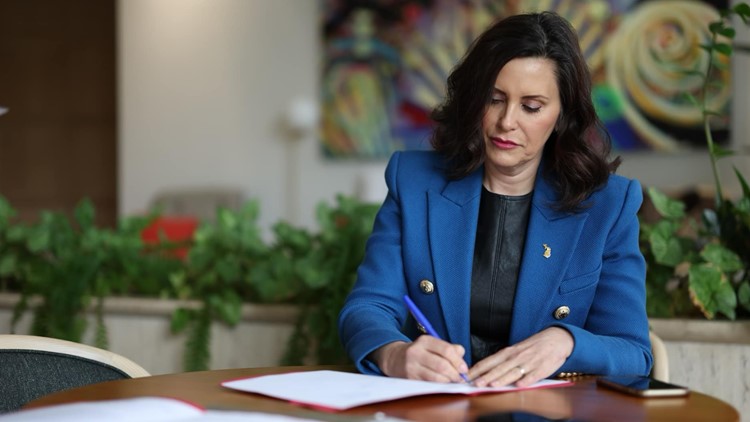GRAND RAPIDS, Mich. — Michigan Governor Gretchen Whitmer's memoir True Gretch hit bookstore shelves Tuesday, at the same time that all eyes in the political realm have been on her next moves and those of her party.
Depicting the book's ten chapters as separate lessons she says she's learned during her time in office and elsewhere, the two-term governor recounts a number of personal experiences and how events from the last five and a half years of her governorship have shaped her outlook.
Touching on themes including the polar vortex of 2019, the Midland dam break of 2020, the Oxford High School shooting in 2021 and the protests and public confrontations with former President Donald Trump over COVID restrictions and supply needs that drew national attention to her identity, Whitmer draws on experiences still fresh in the minds of many Michiganders to convey what she feels are important touchstones amid today's political and social atmospheres.
Addressing some of the most controversial periods and actions during her administration, Whitmer's writing, at times, sought to stand by her decisions when it came to themes like the state's highly-scrutinized COVID-19 restrictions and gun reform.
"You're not going to get everything right immediately, but you've got to get in there and try," she wrote.
At other times, Whitmer sought to assert that she was not above scrutiny, conceding fault for a gathering with friends just before social distancing restrictions were relaxed.
"We are all human," Whitmer wrote. "And we do all fall short sometimes. But that doesn't need to be the end of the story."
Despite what she may have seen as her best intentions, her executive actions during the pandemic sparked responses in the form of protests and fueled anger behind a plot to kidnap her.
Multiple people have now been sentenced in connection to this, with Whitmer revealing that she inquired as to whether she could meet with one of them in order to understand their motives.
But, even with a number of convictions, the governor still made mention of how it has affected her since.
"But now, when I walk into a party or event, I find myself scanning the room," Whitmer wrote. "I look for anything that seems off and take note of where the doors are. It's not that I live in fear, but there's a heightened awareness now that I didn't have before."
Whitmer also recounted what eventually became her first brush with national prominence when, as the state's Senate minority leader in 2013, she took to the floor of the state Senate to explain her opposition to a bill meant to require specific insurance be purchased for abortion coverage - a bill officially repealed by the now-Democratic-controlled legislature earlier this year.
She recalled revealing publicly for the first time, off-script, that she had been raped in college.
"I never in my life imagined talking about it in a public forum," Whitmer recounted. "Yet suddenly, in the course of one short speech, with TV cameras rolling, I had to decide whether to reveal my deepest secret to the world. Once it was out, there was no turning back."
"My mouth went dry," she continued. "It was terrifying to think of opening myself up, of telling this room full of mostly men about being assaulted as a young woman."
Similarly, Whitmer attempts to ensure that the perspective of only the second woman to serve as Michigan's governor is not lost on readers.
Whitmer makes multiple mentions of what she feels were fixations on her clothes and physical figure above her policies.
In particular, she touched on the instance of a news report released following her first State of the State address as governor, in which individuals' comments on her dress and figure were highlighted.
"Until this report came out, I had felt pretty good about my speech. Any serious commentary about its content was generally positive, and I hadn't given a second thought to what I'd worn while delivering it. But when I watched this report about people criticizing my body, I was hurt. Not because people didn't think I looked good--I don't care about that. It was because I was trying to do something good, and met with a torrent of demoralizing, superficial sexist commentary."
While Whitmer makes no mention of a potential presidential run in the book, an autobiography from prominent party leaders or political figures in the United States has often been a precursor for higher ambitions.
Even in Lansing, some state lawmakers have speculated about potential presidential plans she may have for the future and how they feel some of her actions have played into such a potential setting of the stage.
In an interview with the Associated Press, however, Whitmer denied any thought of seeking to head the Democratic ticket this year should national speculation about a potential exit from President Joe Biden come true.
"It’s a distraction more than anything," Whitmer told the AP. "I don’t like seeing my name in articles like that because I’m totally focused on governing and campaigning for the ticket."
After recounting her chapters of lessons, Whitmer ends with a reflection on a quote from President Theodore Roosevelt, which she said she shares with her team amidst each campaign and term in office.
"It is not the critic who counts; not the man who points out how the strong man stumbles, or where the doer of deeds could have done them better," Roosevelt said, as quoted by Whitmer. "The credit belongs to the man who is actually in the arena, whose face is marred by dust and sweat and blood; who strives valiantly; who errs, who comes short again and again, because there is no effort without error and shortcoming; but who does actually strive to do the deeds; who knows the great enthusiasms, the great devotions; who spends himself in a worthy cause; who at the best knows in the end the triumph of high achievement, and who at the worst, if he fails, at least fails while daring greatly, so that his place shall never be with those cold and timid souls who neither know victory nor defeat."
"The 'man' may be a woman," Whitmer responds in her final paragraph. "And she may just be wearing fuchsia."
►Make it easy to keep up to date with more stories like this. Download the 13 ON YOUR SIDE app now.
Have a news tip? Email news@13onyourside.com, visit our Facebook page or Twitter. Subscribe to our YouTube channel.
Watch 13 ON YOUR SIDE for free on Roku, Amazon Fire TV Stick, Apple TV and on your phone.



